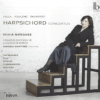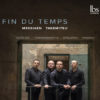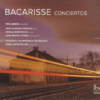Tristan Keuris│Clarinet Quintet & Concertino for bass clarinet and string quartet
CD Emergo Classics 39072
William Nichols, Audio Notes│THE CLARINET MAGAZINE│2003
Estellés is a very complete clarinet player. He is a naturally fluid and poetic musician who communicates the subtle shades of musical character and expression extremely well. Its sound is crisp and beautifully controlled to its fullest extent, and it delivers this music to the listener in the most compelling way.
Estellés is a very complete clarinet player. He is a naturally fluid and poetic musician who communicates the subtle shades of musical character and expression extremely well. Its sound is crisp and beautifully controlled to its fullest extent, and it delivers this music to the listener in the most compelling way. The Orpheus Quartet offers impressive interpretations of these works. The group’s mix, balance and sound range, and their way of making music with a cerebral focus place it among the world-class quartets.
DE VOLKSKRANT│2003
Even more immaculate are the recordings of the Concertino for String Quartet and Bass Clarinet of the late 1970s and the Clarinet Quintet of 1988. Thanks to the contribution of José Luis Estellés, a clarinet player who excelled in virtuosity and flexibility. In the last work it is even more obvious that the clarinet was Keuris’s favorite instrument: on a truly remarkable range of resources a wonderful sound world unfolds under a totally unique signature.
Throughout his life, Tristan Keuris (1946-1996) sought a musical language that was both accessible and current. In his First Quartet [1982], the imprint of Bartók can be appreciated and, through Bartók, also that of Beethoven. In his Second String Quartet, which he composed three years later, he had already declared himself free from those influences. The Orpheus Quartet, an international ensemble, has provided us with high-quality performances of both works. Even more immaculate are the recordings of the Concertino for String Quartet and Bass Clarinet of the late 1970s and the Clarinet Quintet of 1988. Thanks to the contribution of José Luis Estellés, a clarinet player who excelled in virtuosity and flexibility. In the last work it is even more obvious that the clarinet was Keuris’s favorite instrument: on a truly remarkable range of resources a wonderful sound world unfolds under a totally unique signature.
KLASSIEKE ZAKEN│2003
The Clarinet Quintet enables Estellés its qualities, in a rich and pure sound, practically without vibrato.
n his exploratory search for a voice of his own, the Dutch composer Tristan Keuris [1946-1996] never gave up on what history had created. Especially Mahler, Stravinsky and Webern left traces on their music. Without reaction against the key, he knew how to put an impressive mark in the world of music. His symphonic works are regularly scheduled. The Orpheus Quartet proves on this splendid CD that Keuris was able to create a world of his own in chamber music as well. Thanks to this French-Romanian-Dutch group, made up of Charles-André Linale and Emilian Piedicuta [violin], Emile Cantor [viola] and Laurentiu Sbarcea [cello], the two string quartets are shown as sound compositions based on a clearly material definite. The Spanish clarinetist José-Luis Estellés participates in the Quintet for Clarinet [1988] and in the Concertino for Bass Clarinet of the late 70s. In this last work the bass clarinet is not considered a solo instrument, since its sound depth adds a special dimension to the sound of the strings. The Clarinet Quintet enables Estellés its qualities, in a rich and pure sound, practically without vibrato.
DUTCH CLASSICAL MUSIC RADIO STATION│2003
Four highlights of Tristan Keuris chamber music are combined in this CD, with the absolute maximum of the clarinet quintet. […] José Luis Estellés is a sublime clarinetist who plays with the same freedom. Thus, this recording of the clarinet quintet has become a passionate and unstoppable claim of Keuris chamber music: it is guaranteed that whoever dares to listen to it will be persuaded.
Chamber Music by Tristan Keuris
Four highlights of Tristan Keuris chamber music are combined in this CD, with the absolute maximum of the clarinet quintet. Keuris first made his name as a symphonic composer, but that does not alter the fact that his chamber music also deserves all attention. This is particularly rich music that is undeniably connected to the history of romantic classical music, but at the same time it is surprisingly original and has its own voice. The history of the origin of the quartets (and the clarinet quintet) is closely linked with the renowned Orlando Quartet, and for this reason it was not such an easy task for the Orpheus Quartet to make this music of theirs. That they achieved it with distinction is evident through their unconditional abandonment to this music: they audibly enjoy each note. José Luis Estellés is a sublime clarinetist who plays with the same freedom. Thus, this recording of the clarinet quintet has become a passionate and unstoppable claim of Keuris chamber music: it is guaranteed that whoever dares to listen to it will be persuaded.












